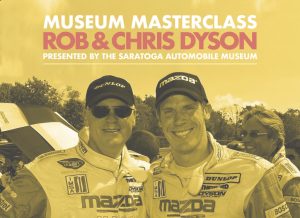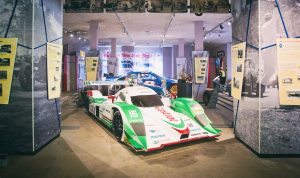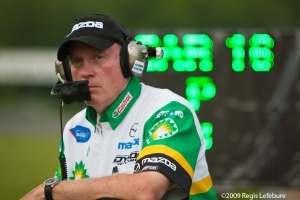A fan favorite and true sports car legend, Butch Leitzinger drove full-time for Dyson Racing for fifteen years and is still a member of the Dyson family having most recently driven for the team at last year’s Petit Le Mans and at Mazda Raceway Laguna Seca. He has thirty-four victories driving for Dyson Racing including two at the 24 Hours of Daytona. He won the IMSA Sportscar Championship twice and the CanAm championship with Dyson Racing. In addition to his accomplishments as a Dyson driver, he has a third 24 Hour of Daytona victory to his credit, a 24 Hour of Le Mans podium, an IMSA GTU championship, Trans Am wins and multiple wins in NASCAR’s Busch North Series.
James Weaver, a twenty-year veteran of Dyson Racing, once said of Butch’s talent: “It is extraordinary how much ability he has. He is such a natural. He does not have to sit in the car for two hours to get a handle on it, he gets on the pace instantly. Butch always takes everything in stride and always performs superbly.”
Here is the first part of a three-part interview with Butch:
How did you come to drive for Dyson Racing?
“I drove for my family’s team (Bob and Sandra Leitzinger) up through 1993. At the end of 1993 we won the GTU championship but Nissan stopped funding the program, so the following year, 1994, I had very little to do. I drove for Nissan in the GTS car at Daytona and Sebring and a few other pick up races. It was pretty slow, so I just started cold calling and sending out resumes including sending one to Rob Dyson. I did not hear anything back but then shortly before Daytona in ‘95, I got a call out of the blue from Rob asking what I was doing for Daytona. I had just talked to somebody and arranged for a pretty weak deal, not enough to keep me fed. I called them back and was able to have them release me. They were happy to let me go because they knew what a good deal it was to drive for Rob. It was a one-race deal. John Paul Jr. was supposed to drive the car, but then he got a year-long deal with BMW, so they gave me a call close to the race. I went down there, met everyone, and had a great time. Unfortunately, we only lasted 20 minutes in the race. I drove very little – maybe ten laps in practice, and never got in the car for the race, but I did not complain about that, and when it came time to get a third driver for Sebring, they asked me if I wanted to come along, and of course there was no hesitation. Once again, it was a one-race deal and this time I got more time in the car and for the rest of the year, it was ‘well, why don’t you come and do this race for us’ and I ended up doing the rest of the season with them.
“It was just the greatest environment for me because I had come from my parents’ team, a family team, where I had an excellent relationship with the crew and it was a great atmosphere and then to come into Dyson which was very similar – a lot of people who had been there for many years with a real feeling of camaraderie. Working with people like Pat Smith, Rob Dyson and James Weaver, I got a real education. It was a perfect place for someone to spend an early part of their career.”
What was your favorite Dyson car to drive?
“It would have to be the Riley and Scott. It had such a wide range. It was a car that you could immediately hop into and go fast. Rob was always very generous with me and allow me to race with other teams. I raced at Le Mans a number of times, did Trans-Am for Tom Gloy, and drove for a variety of teams. I would get a little worried, for example, after doing several days of testing for Le Mans, and then do a couple Trans-Am races before getting back into the Riley and wonder about getting back into form. But you would be leaving the pit lane, and everything would always just feel perfect. A lot of that was the team preparing it so well. Pat Smith knew the car inside and out and the car would always go onto the track very well sorted. The team always had the car ready to go and it was a car you could trust immediately the minute you got into it.”
You won three 24 hours of Daytona – how special is that to a driver?
“You try not to get too emotional about any wins or losses. But the Daytona wins – especially looking back on them now, you realize how hard it is to win a 24 hour race. When we were winning them in ‘97 and ’99, and we were in very good contention other years surrounding our wins, it just felt like it would never stop and there was no limit to how many times you could visit the top step of the podium. Looking back now, you realize how hard it is to assemble all of those ingredients: the right car, the right drivers and the right team, to actually be able to consistently challenge for a win at Daytona. It humbles you to see what a good group you were with to be able to challenge year after year in such a difficult race.”
You are considered one of sportscars’ iconic drivers. Do you consider yourself such?
“To be very honest, I am not sure how I would rate myself. The only thing that I can go on, or that really matters in the end, is that the team I drive for and my co-drivers are happy and they know that I am giving it my all. Whether I actually succeed or not is another matter. I suppose the biggest thing is if the team has confidence in you, that is the most important thing and the only thing that really matters at the end of the day.”
People think of race car drivers as leading very glamorous lives. How much pressure is there in being a professional race car driver?
“It is huge. The greatest thing about being a race car driver is that you have all these people supporting you to do what you want to do the most. They are preparing these beautiful race cars for you and making sure they are in perfect condition and giving you all the assets you need to go out and drive it and do what all of us have wanted to do since we were kids. The problem is that is because there are so many people involved and they are putting so much effort into it, that they have a vested interest in it as well, with their own hopes and expectations. If you are playing golf or a similar single sport, you do not have as many people dependent on the outcome. It is one thing to disappoint yourself, but when you disappoint others, that for me is where the most pressure is: not wanting to have walk back to the pits and say, ‘sorry, I could not do it’ or ‘sorry, I had an accident with the car’. It is very tough when you see the crew deflated because of a mistake you made.”
How do you deal with that?
“I suppose it is the same way a pitcher walks back to the dugout after allowing a grand slam homer. You have to examine yourself and figure out what you did wrong and what you need to work on and repair it. If you can’t do that, than it is probably time to look at something else.”
When did you know you wanted to become a race car driver?
“I honestly think I never did not want to be a driver. When you look through our old family photo albums, I always have a helmet on. I was always dreaming of being a race car driver. Most of my projects and stories and things I would do in school always revolved around cars and racing. All my own personal projects would involve racing. There really was never a question in my mind that was not what I wanted to do. With that being said, I did not let myself believe that I would be a professional and make a living at it. I always figured I would have to get a good education and get a good job. And then I would be able to fund it as a hobby. So when that part developed, that was a big surprise. Growing up around racing. I knew how hard it was to actually do that and that only a small group of people were able to make a living and quite often not make a very good living at it. When it came to the point where I saw that maybe I could make a professional go of it, it was a bit of a shock and it involved a pretty definite departure. I had to stop the road I was on. Right after graduating from college, I decided to go for it. I knew that by focusing on making a full-time effort in racing for four years, there would be a big hole in my resume and if I did not make it, my resume was going to look pretty horrible. One of the biggest questions I faced at that point was how much I might be hurting my future by trying this.”
What was your most satisfying Dyson win?
“It would probably have to be Daytona in ’97. It was definitely a team effort with all seven of us driving and it just got such a monkey off our back for winning a big endurance race. All the aspects of the team really rose to the occasion: car preparation, making great calls in the pits, strategy, the team reacting well to a bunch of problem in the race and all the drivers driving really well. It is a driver’s dream to be part of such a team effort.”


